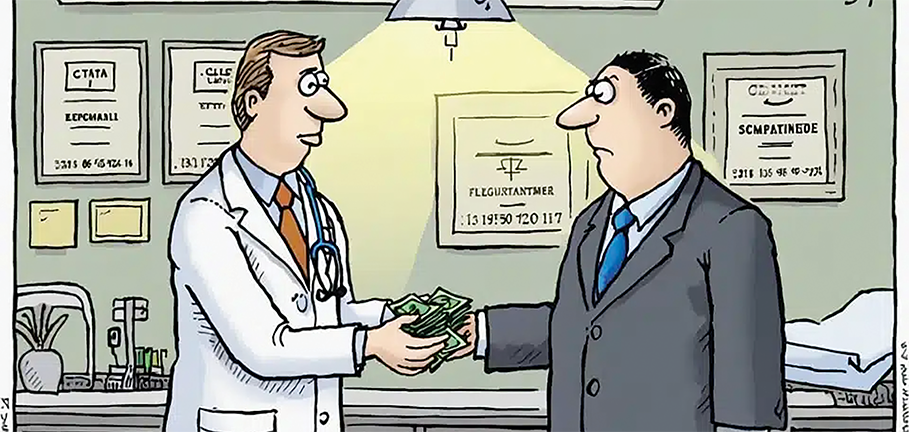LOYALTY: Study finds that doctors who received money from a firm were more likely to prescribe that company’s drugs compared to doctors who received nothing…
By Own Correspondent
NEW HAVEN, Conn. — Nearly four out of five neurologists treating multiple sclerosis patients received pharmaceutical company payments totalling $164 million between 2015 and 2019, according to new research that documents a consistent association between industry payments and prescribing habits.
Doctors who received larger payments were more likely to prescribe the paying company’s drugs over alternatives.
Multiple sclerosis affects nearly one million Americans, according to the National Multiple Sclerosis Society. The disease causes the immune system to attack the brain and spinal cord.
According to the study published in BMJ Open, patients typically need lifelong treatment with specialized medications, with “annual average costs per DMT user ranging from $57,000 to $93,000 in the USA.” MS drug prescriptions are “Medicare’s largest neurologic drug expense despite accounting for a relatively small portion of total claims.”
Led by Dr. Joseph Ross from Yale University, researchers analysed data from 7,401 neurologists who prescribed MS medications to Medicare patients over five years. Nearly 6,000 doctors received industry payments ranging from meals and conference travel to consulting fees and speaking contracts.
While the median payment was $779 per doctor, the money wasn’t distributed evenly. A small group of high earners collected the vast majority: the top 10% of recipients received $155.7 million, which equals 95.2% of all payments made to MS specialists.
Payments were especially common among doctors writing the most prescriptions. Physicians with higher prescription volumes were much more likely to receive payments, particularly for consulting work, speaking engagements, and travel expenses. Among doctors who did receive money, those with higher prescription volumes collected larger sums.
The study found that doctors who received money from a company were more likely to prescribe that company’s drugs compared to doctors who received nothing.
The more money doctors received, the stronger the link became. For example:
• A payment as small as $50 was tied to a slight increase in prescribing that company’s drug.
• At $500, doctors were noticeably more likely to choose that company’s drug.
• At $1,000 or $5,000, the likelihood was even higher.
Speaking fees carried the strongest association. Doctors who received payments for “non-consulting services, such as being a speaker at an event” were 53% more likely to prescribe the paying company’s medications compared to those who received no payments.
The timing of payments also mattered. Doctors who received money from the same company year after year were much more likely to keep prescribing that company’s drugs. If a doctor was paid five years in a row, they were nearly 80% more likely to prescribe that company’s medication compared to doctors who had never received payments. Even payments made four years earlier still had some influence, but the effect was strongest when the payments were recent.
Biogen, maker of popular MS drugs like Avonex and Tecfidera, reached the most doctors by paying 4,898 physicians (66% of all MS neurologists) a total of $33.1 million. Sanofi, which makes Aubagio and Lemtrada, distributed the largest total payments at $71.3 million to 4,183 doctors.
The study also found that doctors who received payments from competing companies were less likely to prescribe a particular company’s drugs if they had not received payments from that specific firm. This highlights how multiple manufacturers vie for physician loyalty in the crowded MS drug market.
Food and beverage payments were the most common, reaching 76% of MS neurologists with typically modest amounts. Speaking fees, while reaching only 10% of doctors, carried much higher dollar amounts and showed the strongest association with prescribing behaviour.
Three major pharmaceutical companies in the MS market — Sanofi, Novartis, and Biogen — recently settled with the U.S. Department of Justice for over $1.5 billion combined to resolve allegations of improper payments designed to influence prescribing. Sanofi agreed to pay $11.85 million, Novartis paid more than $642 million, and Biogen settled for $900 million. All three companies denied wrongdoing as part of their settlements.
Current regulations require companies to publicly report physician payments through a government database. Transparency, however, has not eliminated influence. Some hospitals and health systems, such as Kaiser Permanente, have adopted policies that restrict or ban access for pharmaceutical sales representatives, while others still allow them, making access inconsistent across institutions, according to reports in STAT News and PharmExec.
Multiple sclerosis medications represent a massive financial burden. The study noted that “disease-modifying MS drugs accounted for $33.9 billion in excess medical costs between 2017 and 2019” and constitute “Medicare’s largest neurologic drug expense.” A separate Medicare analysis referenced in the study showed patient out-of-pocket costs increased sevenfold between 2006 and 2016, while federal spending jumped tenfold.
Once patients start an MS medication, doctors rarely switch treatments unless something goes wrong, creating long-term revenue streams for companies that influence initial prescribing decisions. With such high stakes, pharmaceutical firms have strong incentives to court the relatively small number of specialists who control this lucrative market.
For patients facing expensive multiple sclerosis treatments, the study’s findings raise concerns about whether prescribing decisions fully reflect medical need or are influenced by financial relationships between doctors and drug companies. As healthcare costs continue to rise, addressing these conflicts will be key to maintaining trust in medical decision-making and controlling unnecessary spending.





























